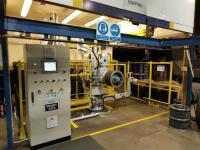Fall in new car market a ‘wake up call’ to policy makers
Environmental goals at risk, says SMMT
The UK new car market declined by -6.8 per cent in 2018, with annual registrations falling for a second year to 2,367,147 units, according to figures released by the Society of Motor Manufacturers and Traders (SMMT). A -5.5 per cent decline in December capped a turbulent year of model changes, regulatory upheaval and continued anti-diesel policies, adding to the ongoing decline in consumer and business confidence.
Private, fleet and business registrations all fell in 2018, with the biggest losses felt in the fleet sector (down -7.3 per cent), while private motorists and smaller business operators registered -6.4 per cent and -5.6 per cent fewer new cars respectively.
Demand also fell across all vehicle segments bar the dual purpose category, which grew by +9.1 per cent to take a fifth of the market (21.2 per cent). Despite registrations of superminis and lower medium cars falling by -2.5 per cent and -9.4 per cent respectively, these smaller vehicles remain the most popular – with a combined 58.7 per cent market share.
The biggest volume decline was seen in the diesel sector, down -29.6 per cent in 2018, with the volume loss equivalent to some 180 per cent of the overall market’s decline. Anti-diesel rhetoric and negative fiscal measures took their toll, with December marking the 21st consecutive month of decline for the fuel type – despite new emissions tests showing diesels deliver in the real world. Growth in registrations of petrol (+8.7 per cent) and alternatively fuelled vehicles (+20.9 per cent) replaced some of the loss but not enough to offset the full shortfall as many diesel owners adopt a ‘wait and see’ approach, keeping hold of their older, more polluting vehicles for longer.
In the AFV sector, petrol electric hybrids remained the most popular choice, up +21.3 per cent to 81,156 units. Plug-in hybrids (PHEVs) also recorded a strong uplift (+24.9 per cent) over the year, though the figures suggest growth is slowing following the removal of the Government’s plug-in car grant for these vehicles in October.
Demand for PHEVs grew almost 30 per cent in the first 10 months, but year on year increases fell to 3.1 per cent and 8.7 per cent in November and December respectively. Pure electric cars, meanwhile, grew 13.8 per cent in the year but, with just 15,474 registered, they still make up only 0.7 per cent of the market. Given the reduction in government incentives, the pace of growth of plug-in cars is now falling significantly behind the EU average.
Average CO2 rises in UK new car fleet
The figures come as SMMT publishes data showing the UK new car fleet average CO2 rose for a second successive year, by 2.9 per cent to 124.5g/km. This is despite huge investment by manufacturers to deliver ever more efficient cars, with the average new or updated model emitting -8.3 per cent less CO2 than that it replaced. While part of this fleet average CO2 increase was due to segment shift and the introduction of the new, more onerous WLTP test which produces higher figures, the move away from diesels is having a significant impact.
Diesels are, on average, 15-20 per cent more efficient than petrol equivalents and so have a substantial role to play in addressing climate change. The hard won gains made by the sector since CO2 records began in 1997 (when the new car fleet average was 189.8g/km) are being undermined by the shift away from diesel and disappointing growth in alternatively fuelled vehicles. This only undersores the challenge both industry and government face in meeting ambitious climate change targets.
Mike Hawes, SMMT chief executive, said: “A second year of substantial decline is a major concern, as falling consumer confidence, confusing fiscal and policy messages and shortages due to regulatory changes have combined to create a highly turbulent market. The industry is facing ever-tougher environmental targets against a backdrop of political and economic uncertainty that is weakening demand so these figures should act as a wake-up call for policy makers.
“Supportive, not punitive measures are needed to grow sales, because replacing older cars with new technologies, whether diesel, petrol, hybrid or plug-in, is good for the environment, the consumer, the industry and the exchequer.
“Despite the overall decline in 2018, demand for new cars in the UK remains solid, with volumes on a par with the preceding 15-year average, and the market still the second biggest in the EU, behind Germany. It is also one of the most diverse, with buyers able to choose from some 350 different models available in fuel types and body styles to suit all driving needs.
“Meanwhile, more than 80 exciting new generation models – 31 of them plug-in electrics – are set to make their showroom debuts in 2019, and with some compelling deals on offer, the industry is continuing to invest to grow the market despite the headwinds.”
Commenting on the SMMT figures, Justin Benson, head of automotive at KPMG UK said: “The decline in new car sales for 2018 was not unexpected. A 26per cent reduction in diesel new car sales is very significant for the industry, but 2018 was also the year we saw a resurgence in petrol powered vehicles and a rise in alternatively fuelled vehicles (AFVs) – specifically battery electric vehicles.
“Although CO2 emissions increased for a second year, more people are buying battery electric vehicles, and whilst these vehicles continue to be a small percentage of overall sales, this is increasing as the technology becomes better known and range anxiety decreases. Rising residual values for electric vehicles will significantly help future new AFV sales in 2019 and beyond. In the meantime, those keeping an eye out for new car bargains should definitely have a battery vehicle on their shortlist in 2019.”




Comments